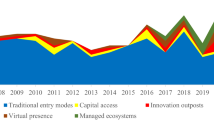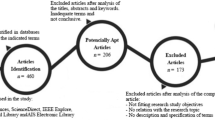Abstract
There has been considerable recognition of the regional embeddedness of the knowledge-based economy and its uneven geographical incidence, with mainly urban or metropolitan areas being the crucibles of knowledge-intensive activities. Drawing from recent research conducted analysing cultural industries, the paper explores how the knowledge-based economy can be built upon, focussing on the value afforded by regional cultural diversity which offers a means of economic development and growth to peripheral regions.
Similar content being viewed by others
References
Arrow, K., 1962, Economic Welfare and the Allocation of Resources for Invention’ in Collected Papers of Kenneth J. Arrow, Volume 5, Production and Capital edited in 1985, Cambridge: Belknap Press
Bearman, D. and J. Trant, 2002, ‘Cultural Institutions in a Networked Environment,’ Stockholm, Available at http://www.archimuse.com
E. Brynjolfsson B. Kahin (Eds) (2000) Understanding the Digital Economy, Data, Tools and Research The MIT Press Cambridge, Massachusetts
G.E. Burcaw (1975) Introduction to Museum Work American Association for State and Local History Nashville, TN
A. Burton-Jones (1999) Knowledge Capitalism – Business, Work and Learning in the New Economy Oxford University Press Oxford
Carlson, S., 2003, ‘After Losing Millions, Columbia U. Will Close Online-Learning Venture’, The Chronicle of Higher Education, available at http://dml.fandm.edu/news/CHE140103.html
M. Castells (1996) The Rise of the Network Society Blackwell Oxford
T.S. Cavusgil T. Kiyak I. Kiyak (2002) ‘Expanding Horizons with e-Learning’ R.F. Sherer S.T. Beaton M.F. Ainia J. Meyer (Eds) Internationalising the Business Curriculum: A Field Guide EditionNumber2 Lakeshore Communications Euclid
Chapman, A., N. Kingsley, and L. Dempsey, 1999, ‘Full disclosure – Realising the Value of Library and Archive Collections,’ a Report to the Pathfinding Group, Available at http://www.ukoln.ac.uk/services/lic/fulldisclosure/report. pdf
P. Cooke (2002) Knowledge Economies Routledge London
P. Cooke C. Laurentis ParticleDe (2002) The Index of Knowledge Economies in the European Union: Performance Rankings of Cities and Regions, Regional Industrial Research Report No. 41 Centre for Advanced Studies Cardiff
Corrocher, N., 2002, ‘Internet Diffusion Dynamics in Europe: Demand Scenarios and the Digital Divide,’ Report no. 29, STAR (Socio-Economic Trends Assessment for the Digital Revolution) Project, Available at http://www.databank.it/star/list_issue/f_2.html
T. Cowen E. Crampton (2003) Market Failure or Success, The New Debate Edward Elgar Publishing Northampton
InstitutionalAuthorNameDCMS (2001) Culture Online DCMS, Department for Culture, Media and Sports London
H. Demsetz (1968) ArticleTitle‘Why Regulate Utilities?’ Journal of Law and Economics 11 55–66 Occurrence Handle10.1086/466643
Donnelly, M. and S. Ross, 2003, ‘Technologies and New Socio-Economic Business Models,’ DigiCULT Technology Watch Report 2, DigiCULT
G. Dosi (1988) ArticleTitle‘Sources, Procedures and Microeconomic Effects of Innovation’ Journal of Economic Literature 26 IssueID3 1120–1171
Doyle, G., 2002a, ‘Economics and ‘New’ Media,’ Paper Presented at the 5th World Media Economics Conference, Turku, Finland Available at http://www.tukkk.fi/mediagroup/5WMEC%20PAPERS/Doyle.pdf
G. Doyle (2002b) Understanding Media Economics Sage Publications London
Enkenberg, J. and M.J. Kents, 2002, Finland: WP3 – WP4 Final Report, Technology, Economics and Diversity in the Periphery Project, unpublished
European Commission, 2002, ‘European Digital Content in the Global Networks,’ Available at http://www.cordis.lu/econtent/
InstitutionalAuthorNameEurostat (2001) Community Innovation Survey Eurostat Brussels
Florida, R., (2000). ‘Competing in the Age of Talent: Quality of Place and the New Economy,’ Report prepared for the Mellon R.K. Foundation, Heinz Endowments, and Sustainable Pittsburgh
R. Florida (2002) The Rise of the Creative Class Basic Books New York
R. Florida G. Gates (2001) Technology and Tolerance: The Importance of Diversity to High-Technology Growth Centre on Urban & Metropolitan Policy, The Brookings Institution Washington, DC
Godin, B., 2003, ‘The Knowledge-Based Economy: Conceptual Framework or Buzzword?’ Project on the History and Sociology of S&T Statistics, Working Paper no. 24
B. Graham (2002) ArticleTitleHeritage as Knowledge in the Innovative City: Capital or Culture? New Media and Society 2 IssueID3 286–312
Hane, J.P., 2003, ‘Columbia University to Close Fathom.com,’ Available at http://www.infotoday.com/newsbreaks/nb 030113-2.htm
A. Kerr (2000) ArticleTitle‘Media Diversity and Cultural Identities – The Development of Multimedia Content in Ireland,’ New Media and Society 2 IssueID3 286–312 Occurrence Handle10.1177/14614440022225823
K. Levis (2002) The Business of (e)Learning: A Revolution in Training and Education Screen Digest Limited London
B. Lundvall (1992) National Systems of Innovation, Towards a Theory of Innovation and Interactive Learning Pinter London
F. Machlup (1962) The Production and Distribution of Knowledge in the United States Princeton University Press Princeton
Manzhukh, Z., 2003, ‘Commercial Exploitation of Cultural Heritage in Memory Institutions’ Presented at Inforum, Commercial Exploitation of Cultural Heritage in Memory Institutions, Prague, May 2003
R. McAdam S. McCreedy (1999) ArticleTitleA Critical Review of Knowledge Management Models The Learning Organisation 6 IssueID3 91–100
McCallum-Fournier, 1999, ‘Entertainment and Education Join Forces for the Millennium’ Available at http://www.fundandedutain.com/define.htm
D. Mowery N. Rosenberg (1979) ArticleTitleThe Influence of Market Demand upon Innovation: A Critical Review of Some Recent Empirical Studies Research Policy 8 IssueID2 102–153 Occurrence Handle10.1016/0048-7333(79)90019-2
D. Neef (1998) The Knowledge Economy Butterworth-Heeinemann Boston
P. Nedle M. Strubell G. Williams (1996) Euromosaic: The Production and Reproduction of Minority Language Groups in the EC European Commission Brussels
R. Nelson (Eds) (1993) National Innovation Systems: A Comparative Analysis Oxford University Press New York
NoF, 2001, ‘NoF-Digitise Programme, New Opportunities Fund,’ Available at http://www.enrichuk.net/
I. Nonaka D. Teece (2001) Managing Industrial Knowledge Sage London
InstitutionalAuthorNameOECD (1996) The Knowledge-Based Economy OECD Paris
InstitutionalAuthorNameOECD (2001) ‘The New Economy: Beyond the Hipe,’ Final Report on the OECD Growth Project OECD Paris
Polèse, M. and R. Shearmur, 2002, The Periphery in the Knowledge Economy: The Spatial Dynamics of the Canadian Economy and the Future of Non-Metropolitan Regions in Quebec and the Atlantic Provinces, INRS Urbanisation, Montreal: Culture et Société and the Canadian Institute for Research on Regional Development
N. Selwyn S. Gorard (2002) The Information Age University of Wales Press Cardiff
J. Stiglitz (1998) ArticleTitle‘The Private Uses of Public Interests: Incentives and Institutions’ The Journal of Economic Perspectives 12 IssueID2 3–22
J. Swan S. Newell H. Scarbrough D. Hislop (1999) ArticleTitle‘Knowledge Management and Innovation: Networks and Networking’ Journal of Knowledge Management 3 IssueID4 262–275 Occurrence Handle10.1108/13673279910304014
Takeuchi, H., 1998, ‘Beyond Knowledge Management: Lessons from Japan,’ Available at http://www.sveiby.com/articles/lessonsjapan.htm
D. Tapscott D. Lowi Ticoll (1998) Blueprint to the Digital Economy, Creating Wealth in the Era of E-Business McGraw-Hill New York
Trant, J., 2002, ‘The Web of Collaboration: New Technologies, New Opportunities for the Visual Arts in a Digital Age,’ Presented at the Smith College Symposium, The Visual Arts in the Digital Age, Stockholm
van den Ende, J. and W. Dolfsma, 2002, ‘Technology Push, Demand Pull and the Shaping of Technological Paradigms – Patterns in the Development of Computing Technology,’ Erim Report Series Research in Management, Available at http://ideas.repec.org/p/dgr/eureri/2002248.html
D. Waterman (2001) ArticleTitle‘The Economics of Internet TV: New Niches vs. Mass Audiences’ The Journal of Policy, Regulation and Strategy for Telecommunications Information and Media 3 IssueID3 215–229
E. Wenger (1998) Communities of Practice: Learning, Meaning and Identity Cambridge University Press Cambridge
G. Williams (2000) ArticleTitle‘The Digital Value Chain and Economic Transformation: Rethinking Regional Development in The New Economy’ Contemporary Wales 13 94–115
Williams, G. and C. De Laurentis, 2003, ‘Technology, Economics and Diversity in the Periphery, Technology, Economics and Diversity in the Periphery Project, EU IST-1999-20193,’ Final Report
Williams, G. and C. De Laurentis, 2002, ‘Wales: WP3–WP4’ Final Report, Technology, Economics and Diversity in the Periphery, unpublished
Author information
Authors and Affiliations
Corresponding author
Rights and permissions
About this article
Cite this article
De Laurentis, C. Digital Knowledge Exploitation: ICT, Memory Institutions and Innovation from Cultural Assets. J Technol Transfer 31, 77–89 (2006). https://doi.org/10.1007/s10961-005-5014-6
Published:
Issue Date:
DOI: https://doi.org/10.1007/s10961-005-5014-6




